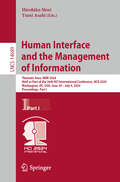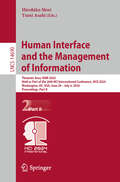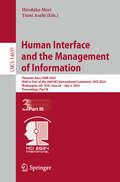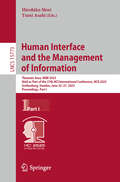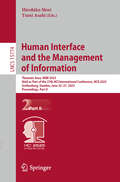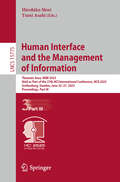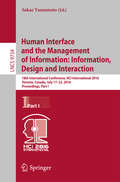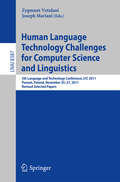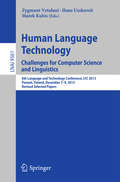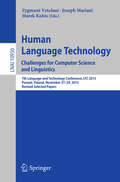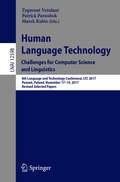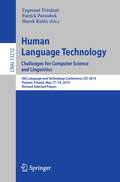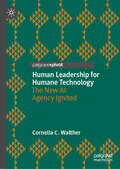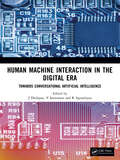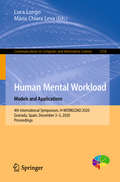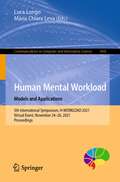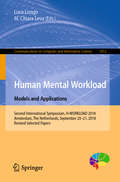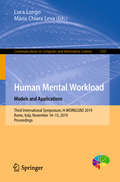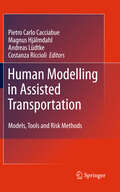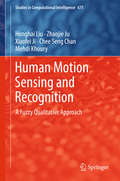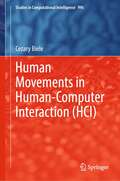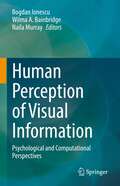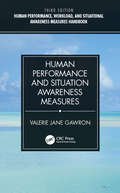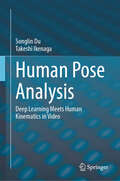- Table View
- List View
Human Interface and the Management of Information: Thematic Area, HIMI 2024, Held as Part of the 26th HCI International Conference, HCII 2024, Washington, DC, USA, June 29–July 4, 2024, Proceedings, Part I (Lecture Notes in Computer Science #14689)
by Hirohiko Mori Yumi AsahiThis three-volume set LNCS 14789-14791 constitutes the thoroughly refereed proceedings of the thematic area Human Interface and the Management of Information, HIMI 2024, held as part of the 26th International Conference on Human-Computer Interaction, HCI International 2024 (HCII 2024), was held as a hybrid event in Washington DC, USA, during June/July 2024. The total of 1271 papers and 309 posters included in the HCII 2023 proceedings was carefully reviewed and selected from 5108 submissions. The HIMI conference addressed approaches and objectives of information and data design, retrieval, presentation and visualization, management, and evaluation in human computer interaction in a variety of application domains, such as, for example, learning, work, decision, collaboration, medical support, and service engineering, and much more.
Human Interface and the Management of Information: Thematic Area, HIMI 2024, Held as Part of the 26th HCI International Conference, HCII 2024, Washington, DC, USA, June 29–July 4, 2024, Proceedings, Part II (Lecture Notes in Computer Science #14690)
by Hirohiko Mori Yumi AsahiThis three-volume set LNCS 14789-14791 constitutes the thoroughly refereed proceedings of the thematic area Human Interface and the Management of Information, HIMI 2024, held as part of the 26th International Conference on Human-Computer Interaction, HCI International 2024 (HCII 2024), was held as a hybrid event in Washington DC, USA, during June/July 2024. The total of 1271 papers and 309 posters included in the HCII 2023 proceedings was carefully reviewed and selected from 5108 submissions. The HIMI conference addressed approaches and objectives of information and data design, retrieval, presentation and visualization, management, and evaluation in human computer interaction in a variety of application domains, such as, for example, learning, work, decision, collaboration, medical support, and service engineering, and much more.
Human Interface and the Management of Information: Thematic Area, HIMI 2024, Held as Part of the 26th HCI International Conference, HCII 2024, Washington, DC, USA, June 29–July 4, 2024, Proceedings, Part III (Lecture Notes in Computer Science #14691)
by Hirohiko Mori Yumi AsahiThis three-volume set LNCS 14789-14791 constitutes the thoroughly refereed proceedings of the thematic area Human Interface and the Management of Information, HIMI 2024, held as part of the 26th International Conference on Human-Computer Interaction, HCI International 2024 (HCII 2024), was held as a hybrid event in Washington DC, USA, during June/July 2024. The total of 1271 papers and 309 posters included in the HCII 2023 proceedings was carefully reviewed and selected from 5108 submissions. The HIMI conference addressed approaches and objectives of information and data design, retrieval, presentation and visualization, management, and evaluation in human computer interaction in a variety of application domains, such as, for example, learning, work, decision, collaboration, medical support, and service engineering, and much more.
Human Interface and the Management of Information: Thematic Area, HIMI 2025, Held as Part of the 27th HCI International Conference, HCII 2025, Gothenburg, Sweden, June 22–27, 2025, Proceedings, Part I (Lecture Notes in Computer Science #15773)
by Hirohiko Mori Yumi AsahiThe three-volume set LNCS 15773 - 15775 constitutes the thoroughly refereed proceedings of the thematic area Human Interface and the Management of Information, HIMI 2025, held as part of the 27th International Conference on Human-Computer Interaction, HCI International 2025 (HCII 2025), which was held in Gothenburg, Sweden, during June 22–27, 2025. The total of 1430 papers and 355 posters included in the HCII 2025 proceedings was carefully reviewed and selected from 7972 submissions. The papers in these proceedings have been organized in topical sections as follows: Part I: Information design and visualization; human-human and human-AI collaboration; user experience design and evaluation; Part II: Information in eHealth; information, knowledge and learning; Part III: Multimodality and information; eCommerce and industrial applications.
Human Interface and the Management of Information: Thematic Area, HIMI 2025, Held as Part of the 27th HCI International Conference, HCII 2025, Gothenburg, Sweden, June 22–27, 2025, Proceedings, Part II (Lecture Notes in Computer Science #15774)
by Hirohiko Mori Yumi AsahiThe three-volume set LNCS 15773 - 15775 constitutes the thoroughly refereed proceedings of the thematic area Human Interface and the Management of Information, HIMI 2025, held as part of the 27th International Conference on Human-Computer Interaction, HCI International 2025 (HCII 2025), which was held in Gothenburg, Sweden, during June 22–27, 2025. The total of 1430 papers and 355 posters included in the HCII 2025 proceedings was carefully reviewed and selected from 7972 submissions. The papers in these proceedings have been organized in topical sections as follows: Part I: Information design and visualization; human-human and human-AI collaboration; user experience design and evaluation; Part II: Information in eHealth; information, knowledge and learning; Part III: Multimodality and information; eCommerce and industrial applications.
Human Interface and the Management of Information: Thematic Area, HIMI 2025, Held as Part of the 27th HCI International Conference, HCII 2025, Gothenburg, Sweden, June 22–27, 2025, Proceedings, Part III (Lecture Notes in Computer Science #15775)
by Hirohiko Mori Yumi AsahiThe three-volume set LNCS 15773 - 15775 constitutes the thoroughly refereed proceedings of the thematic area Human Interface and the Management of Information, HIMI 2025, held as part of the 27th International Conference on Human-Computer Interaction, HCI International 2025 (HCII 2025), which was held in Gothenburg, Sweden, during June 22–27, 2025. The total of 1430 papers and 355 posters included in the HCII 2025 proceedings was carefully reviewed and selected from 7972 submissions. The papers in these proceedings have been organized in topical sections as follows: Part I: Information design and visualization; human-human and human-AI collaboration; user experience design and evaluation; Part II: Information in eHealth; information, knowledge and learning; Part III: Multimodality and information; eCommerce and industrial applications.
Human Interface and the Management of Information:Information, Design and Interaction
by Sakae YamamotoThe three-volume set LNCS 8016, 8017, and 8018 constitutes the refereed proceedings of the 15th International Conference on Human-Computer Interaction, HCII 2013, held in Las Vegas, NV, USA in July 2013. The total of 1666 papers and 303 posters presented at the HCII 2013 conferences was carefully reviewed and selected from 5210 submissions. These papers address the latest research and development efforts and highlight the human aspects of design and use of computing systems. The papers accepted for presentation thoroughly cover the entire field of human-computer Interaction, addressing major advances in knowledge and effective use of computers in a variety of application areas. This volume contains papers in the thematic area of human interface and the management of Information, addressing the following major topics: interacting with information, information searching, browsing and structuring, design and development methods and tools for interactive systems and services, personalized information and interaction, cognitive and emotional aspects of interacting with information.
Human Language Technology Challenges for Computer Science and Linguistics
by Joseph Mariani Zygmunt VetulaniThis book constitutes the refereed proceedings of the 5th Language and Technology Conference: Challenges for Computer Science and Linguistics, LTC 2011, held in Poznan, Poland, in November 2011. The 44 revised and in many cases substantially extended papers presented in this volume were carefully reviewed and selected from 111 submissions. The focus of the papers is on the following topics: speech, parsing, computational semantics, text analysis, text annotation, language resources: general issues, language resources: ontologies and Wordnets and machine translation.
Human Language Technology Challenges for Computer Science and Linguistics: 5th Language and Technology Conference, LTC 2011, Poznań, Poland, November 25--27, 2011, Revised Selected Papers (Lecture Notes in Computer Science #8387)
by Zygmunt Vetulani and Joseph MarianiThis book constitutes the refereed proceedings of the 5th Language and Technology Conference: Challenges for Computer Science and Linguistics, LTC 2011, held in Poznan, Poland, in November 2011. The 44 revised and in many cases substantially extended papers presented in this volume were carefully reviewed and selected from 111 submissions. The focus of the papers is on the following topics: speech, parsing, computational semantics, text analysis, text annotation, language resources: general issues, language resources: ontologies and Wordnets and machine translation.
Human Language Technology. Challenges for Computer Science and Linguistics
by Zygmunt Vetulani Hans Uszkoreit Marek KubisThis book constitutes the refereed proceedings of the 5th Language and Technology Conference: Challenges for Computer Science and Linguistics, LTC 2011, held in Poznan, Poland, in November 2011. The 44 revised and in many cases substantially extended papers presented in this volume were carefully reviewed and selected from 111 submissions. The focus of the papers is on the following topics: speech, parsing, computational semantics, text analysis, text annotation, language resources: general issues, language resources: ontologies and Wordnets and machine translation.
Human Language Technology. Challenges for Computer Science and Linguistics: 7th Language and Technology Conference, LTC 2015, Poznań, Poland, November 27-29, 2015, Revised Selected Papers (Lecture Notes in Computer Science #10930)
by Joseph Mariani Zygmunt Vetulani Marek KubisThis book constitutes the refereed proceedings of the 7h Language and Technology Conference: Challenges for Computer Science and Linguistics, LTC 2015, held in Poznan, Poland, in November 2015. The 31 revised papers presented in this volume were carefully reviewed and selected from 108 submissions. The papers selected to this volume belong to various fields of: Speech Processing; Multiword Expressions; Parsing; Language Resources and Tools; Ontologies and Wordnets; Machine Translation; Information and Data Extraction; Text Engineering and Processing; Applications in Language Learning; Emotions, Decisions and Opinions; Less-Resourced Languages.
Human Language Technology. Challenges for Computer Science and Linguistics: 8th Language and Technology Conference, LTC 2017, Poznań, Poland, November 17–19, 2017, Revised Selected Papers (Lecture Notes in Computer Science #12598)
by Zygmunt Vetulani Marek Kubis Patrick ParoubekThis book constitutes the refereed proceedings of the 8th Language and Technology Conference: Challenges for Computer Science and Linguistics, LTC 2017, held in Poznan, Poland, in November 2017. The 26 revised papers presented in this volume were carefully reviewed and selected from 97 submissions. The papers selected to this volume belong to various fields of: Language Resources, Tools and Evaluation, Less-Resourced-Languages, Speech Processing, Morphology, Computational Semantics, Machine Translation, and Information Retrieval and Information Extraction.
Human Language Technology. Challenges for Computer Science and Linguistics: 9th Language and Technology Conference, LTC 2019, Poznan, Poland, May 17–19, 2019, Revised Selected Papers (Lecture Notes in Computer Science #13212)
by Zygmunt Vetulani Marek Kubis Patrick ParoubekThis book constitutes the refereed proceedings of the 9th Language and Technology Conference: Challenges for Computer Science and Linguistics, LTC 2019, held in Poznan, Poland, in May 2019. The 24 revised papers presented in this volume were carefully reviewed and selected from 67 submissions. The papers are categorized into the following topical sub-headings: Speech Processing; Language Resources and Tools; Computational Semantics; Emotions, Decisions and Opinions; Digital Humanities; Evaluation; and Legal Aspects.
Human Leadership for Humane Technology: The New AI: Agency Ignited
by Cornelia C. WaltherThis book explores the relationship of natural and artificial intelligence in our rapidly evolving world. It does so anchored in an innovative multidisciplinary framework and the premise that society is a composition of multiple dimensions, with individuals (micro), communities (meso), countries (macro) and planet (meta) in the collective sphere, and individuals themselves as multidimensional beings (aspirations, emotions, thoughts, sensations). This perspective is applied to analyze the implications of our transition into a phase where online and offline realms are increasingly intertwined. Special attention is given to the influence of all pervasive technology on our perception of the self and society. The central message is that we must learn to harness Agency amid AI, which entails double literacy – of artificial and natural intelligence.
Human Machine Interaction in the Digital Era: Towards Conversational Artificial Intelligence
by J. Dhilipan V. Saravanan R. AgusthiyarThe Human Machine Interaction in the Digital Era (ICHMIDE) 2023 conference aims to address the main issues of concern in the design issues with a particular emphasis on the design and development of interfaces for autonomous robots. Its main objective is to provide an international forum for the dissemination and exchange of up-to-date scientific information on research related to integrated human/machine systems at multiple scales, and includes areas such as human/machine interaction, engineering mathematical models, assistive technologies, system modelling, design, testing and validation. The organization of ICHMS is based on the following Track types: Smart Applications for Digital Era, Computational Mathematical and Electronics, Intelligent Systems in Security and Communication Technologies, Technological Interventions using AI and Machine Learning, Applied Science, and IoT Techniques for Industries.
Human Mental Workload: 4th International Symposium, H-WORKLOAD 2020, Granada, Spain, December 3–5, 2020, Proceedings (Communications in Computer and Information Science #1318)
by Luca Longo Maria Chiara LevaThis book constitutes the refereed proceedings of the 4th International Symposium on Human Mental Workload: Models and Applications, H-WORKLOAD 2020, held in Granda, Spain*, in December 2020.The volume presents one keynote paper as well as 13 revised full papers, which were carefully reviewed and selected from 22 submissions. The papers are organized in two topical sections on models and applications.*The conference was held virtually due to the COVID-19 pandemic.
Human Mental Workload: 5th International Symposium, H-WORKLOAD 2021, Virtual Event, November 24–26, 2021, Proceedings (Communications in Computer and Information Science #1493)
by Luca Longo Maria Chiara LevaThis book constitutes the refereed proceedings of the 5th International Symposium on Human Mental Workload: Models and Applications, H-WORKLOAD 2021, held virtually in November 2021.The volume presents 9 revised full papers, which were carefully reviewed and selected from 16 submissions. The papers are organized in two topical sections on models and applications.
Human Mental Workload: Second International Symposium, H-WORKLOAD 2018, Amsterdam, The Netherlands, September 20-21, 2018, Revised Selected Papers (Communications in Computer and Information Science #1012)
by Luca Longo M. Chiara LevaThis book constitutes the refereed proceedings of the Second International Symposium on Human Mental Workload: Models and Applications, H-WORKLOAD 2018, held in Amsterdam, The Netherlands, in September 2018. The 15 revised full papers presented together with one keynote were carefully reviewed and selected from 31 submissions. The papers are organized in two topical sections on models and applications.
Human Mental Workload: Third International Symposium, H-WORKLOAD 2019, Rome, Italy, November 14–15, 2019, Proceedings (Communications in Computer and Information Science #1107)
by Luca Longo Maria Chiara LevaThis book constitutes the refereed proceedings of the Third International Symposium on Human Mental Workload: Models and Applications, H-WORKLOAD 2019, held in Rome, Italy, in November 2019.The volume presents one keynote paper as well as 14 revised full papers, which were carefully reviewed and selected from 32 submissions. The papers are organized in two topical sections on models and applications.
Human Modelling in Assisted Transportation
by Carlo Cacciabue Magnus Hjälmdahl Costanza Riccioli Andreas LuedtkeThe objective of this Workshop is to confront models, methods and tools developed within the projects with the ongoing research worldwide and to provide an environment for fruitful exchange of ideas. The main topics are: 1. Advanced human models in transportation. 2. Human Errors and Risk Assessment in design processes of assistance systems. 3. Methods and tools to prevent erroneous behaviour to mitigate its consequences. The Workshop will consist of 10 keynote lectures as well as approximately 28 peer reviewed papers.
Human Motion Sensing and Recognition: A Fuzzy Qualitative Approach (Studies in Computational Intelligence #675)
by Honghai Liu Zhaojie Ju Xiaofei Ji Chee Seng Chan Mehdi KhouryThis book introduces readers to the latest exciting advances in human motion sensing and recognition, from the theoretical development of fuzzy approaches to their applications. The topics covered include human motion recognition in 2D and 3D, hand motion analysis with contact sensors, and vision-based view-invariant motion recognition, especially from the perspective of Fuzzy Qualitative techniques.With the rapid development of technologies in microelectronics, computers, networks, and robotics over the last decade, increasing attention has been focused on human motion sensing and recognition in many emerging and active disciplines where human motions need to be automatically tracked, analyzed or understood, such as smart surveillance, intelligent human-computer interaction, robot motion learning, and interactive gaming. Current challenges mainly stem from the dynamic environment, data multi-modality, uncertain sensory information, and real-time issues.These techniques are shown to effectively address the above challenges by bridging the gap between symbolic cognitive functions and numerical sensing & control tasks in intelligent systems. The book not only serves as a valuable reference source for researchers and professionals in the fields of computer vision and robotics, but will also benefit practitioners and graduates/postgraduates seeking advanced information on fuzzy techniques and their applications in motion analysis.
Human Movements in Human-Computer Interaction (Studies in Computational Intelligence #996)
by Cezary BieleThis book discusses human–computer interaction (HCI) which is a multidisciplinary field of study which aims at developing and implementing tools and techniques to attain an effective and efficient interaction between the humans (the users) and computers. In recent years, there is an increase of interest of HCI researchers and practitioners in the inclusion of gaze gestures which can greatly enhance the communication between the human user and the computer, as well as other more “physical” communication involving all what can be learned from movements of the human body, from face, hand, leg, foot, etc., to the whole body movement, even extending to the involvement of groups of agents, even society. These explicitly human-centric issues in the development, design, analysis, and implementation of the HCI systems are discussed in the book. A comprehensive state of the art is given complemented with original own proposals. As opposed to more traditional formal and IT based analyses, the discussion is here more focused on relevant research results from psychology and psychophysiology, and other soft, cognitive, etc., sciences. Remarks on the relevance of affective computing are also mentioned.
Human Perception of Visual Information: Psychological and Computational Perspectives
by Bogdan Ionescu Wilma A. Bainbridge Naila MurrayRecent years have witnessed important advancements in our understanding of the psychological underpinnings of subjective properties of visual information, such as aesthetics, memorability, or induced emotions. Concurrently, computational models of objective visual properties such as semantic labelling and geometric relationships have made significant breakthroughs using the latest achievements in machine learning and large-scale data collection. There has also been limited but important work exploiting these breakthroughs to improve computational modelling of subjective visual properties. The time is ripe to explore how advances in both of these fields of study can be mutually enriching and lead to further progress.This book combines perspectives from psychology and machine learning to showcase a new, unified understanding of how images and videos influence high-level visual perception - particularly interestingness, affective values and emotions, aesthetic values, memorability, novelty, complexity, visual composition and stylistic attributes, and creativity. These human-based metrics are interesting for a very broad range of current applications, ranging from content retrieval and search, storytelling, to targeted advertising, education and learning, and content filtering.Work already exists in the literature that studies the psychological aspects of these notions or investigates potential correlations between two or more of these human concepts. Attempts at building computational models capable of predicting such notions can also be found, using state-of-the-art machine learning techniques. Nevertheless their performance proves that there is still room for improvement, as the tasks are by nature highly challenging and multifaceted, requiring thought on both the psychological implications of the human concepts, as well as their translation to machines.
Human Performance and Situation Awareness Measures
by Valerie GawronThis book was developed to help researchers and practitioners select measures to be used in the evaluation of human/machine systems. The book begins with an overview of the steps involved in developing a test to measure human performance. This is followed by a definition of human performance and a review of human performance measures. Another section defines situational awareness with reviews of situational awareness measures. For both the performance and situational awareness sections, each measure is described, along with its strengths and limitations, data requirements, threshold values, and sources of further information. To make this reference easier to use, extensive author and subject indices are provided. <P><P>Features <li>Provides a short engineering tutorial on experimental design <li>Offers readily accessible information on human performance and situational awareness (SA) measures <li>Presents general description of the measure <li>Covers data collection, reduction, and analysis requirements <li>Details the strengths and limitations or restrictions of each measure, including proprietary rights or restrictions
Human Pose Analysis: Deep Learning Meets Human Kinematics in Video
by Songlin Du Takeshi IkenagaThis book stands at the intersection of computer vision, artificial intelligence, and human kinematics, offering a comprehensive exploration of the principles, methodologies, and applications of human pose analysis in video data. It covers two main aspects: human body pose analysis and human head pose analysis. Human body pose analysis involves estimating the position and orientation of major joints and body parts, such as the head, neck, shoulders, elbows, wrists, hips, knees, and ankles, to capture the entire body posture in 2D or 3D space. In contrast, human head pose analysis focuses solely on the head’s orientation, typically estimating the angles of rotation around the yaw, pitch, and roll axes to determine the direction in which a person is looking or tilting their head. The book is divided into three parts, each detailing recent research in different areas of pose analysis. The first chapter provides an overview of human body and head pose analysis, including the fundamental principles of kinematic representation, as well as commonly used datasets and evaluation metrics. The first part, consisting of Chapters 2 and 3, delves into 2D human body pose analysis. The second part, spanning Chapters 4 through 7, covers the latest advancements in 3D human body pose estimation, focusing on inferring 3D positions and orientations of body joints from 2D images or videos. The third part, covering Chapters 8 and 9, presents recent studies on 3D human head pose analysis, encompassing both 3D head pose estimation and prediction. The final chapter concludes by summarizing the techniques discussed and outlining future research directions and applications in human body and head pose analysis.
